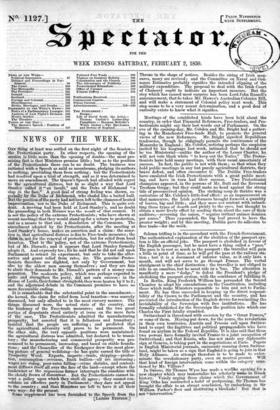Meetings of the established kinds have been held about the
country, in order that Financial Reformers, Free-traders, and Pro- tectionists might say their last words out of Parliament. On the eve of the opening-clay, Mr. Cobden and Mr. Bright had a gather- ing in the Manchester Free-trade Hall, to promote the general views of the new Reformers. Mr. Bright signified Republican tendencies, though he obligingly permits the continuance of the Monarchy in England ; Mr. Cobden, noticing perhaps the suspicion incited by his language last week, intimated that he should not be too Ministerial—unlike the author of the Lesser Charter, he will not vote black white "to keep out the Tories." The Protec- tionists have held many meetings, with their usual uncertainty of success. In fact, the public is not with them ; so that when they hold public meetings in any but purely agricultural districts they brava defeat, and often encounter it. The Dublin Free-tinders have emulated the Irish Protectionists with a great public meet- ing, and have in turn had their success. Two Protectionist champions appeared, in the persons of Mr. Butt and the Reverend Tresham Gregg; but they could make no head against the strong tide of preconceived opinion. The striking coup de theatre was a caricature of Mr. CoMen's little-loaf effect : as an improvement on that manceuvre, the Irish performers brought forward a quantity of loaves, big and little ; and they were not content with submit- tine. those types of dearth and plenty to the eyes, but thought to obtain a more lively effect by sending them about the ears of their auditors,—reversing the canon, " segnius irritant animos demissa per sures." Thus expounded, the big loaf proved to have the greater weight; and by this meeting, Dublin gave its adhesion to free trade—for the week.


























